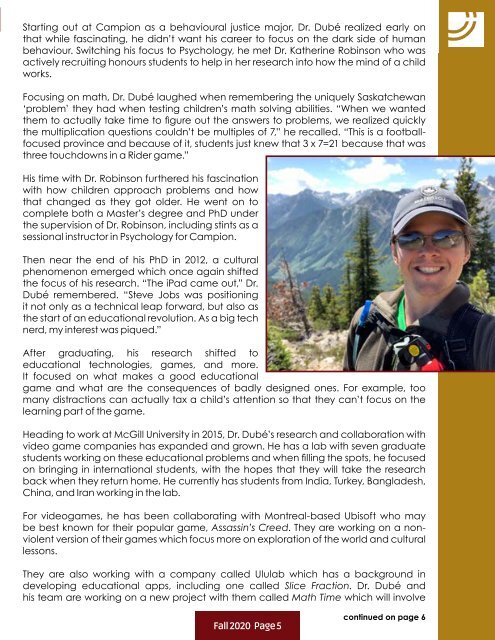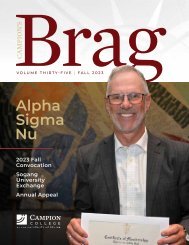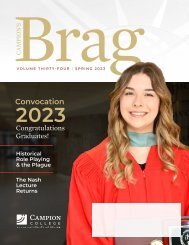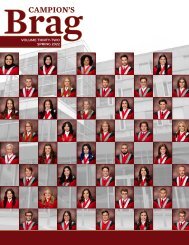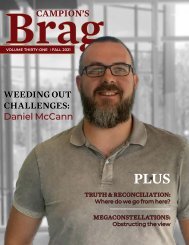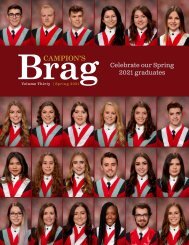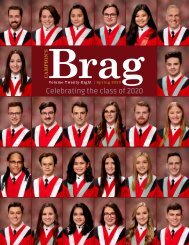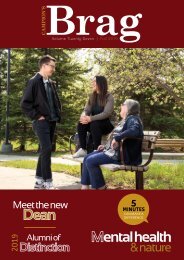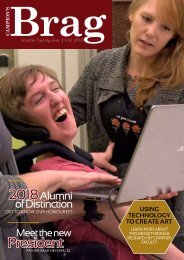Brag-Fall2020
You also want an ePaper? Increase the reach of your titles
YUMPU automatically turns print PDFs into web optimized ePapers that Google loves.
Starting out at Campion as a behavioural justice major, Dr. Dubé realized early on<br />
that while fascinating, he didn’t want his career to focus on the dark side of human<br />
behaviour. Switching his focus to Psychology, he met Dr. Katherine Robinson who was<br />
actively recruiting honours students to help in her research into how the mind of a child<br />
works.<br />
Focusing on math, Dr. Dubé laughed when remembering the uniquely Saskatchewan<br />
‘problem’ they had when testing children’s math solving abilities. “When we wanted<br />
them to actually take time to figure out the answers to problems, we realized quickly<br />
the multiplication questions couldn’t be multiples of 7,” he recalled. “This is a footballfocused<br />
province and because of it, students just knew that 3 x 7=21 because that was<br />
three touchdowns in a Rider game.”<br />
His time with Dr. Robinson furthered his fascination<br />
with how children approach problems and how<br />
that changed as they got older. He went on to<br />
complete both a Master’s degree and PhD under<br />
the supervision of Dr. Robinson, including stints as a<br />
sessional instructor in Psychology for Campion.<br />
Then near the end of his PhD in 2012, a cultural<br />
phenomenon emerged which once again shifted<br />
the focus of his research. “The iPad came out,” Dr.<br />
Dubé remembered. “Steve Jobs was positioning<br />
it not only as a technical leap forward, but also as<br />
the start of an educational revolution. As a big tech<br />
nerd, my interest was piqued.”<br />
After graduating, his research shifted to<br />
educational technologies, games, and more.<br />
It focused on what makes a good educational<br />
game and what are the consequences of badly designed ones. For example, too<br />
many distractions can actually tax a child’s attention so that they can’t focus on the<br />
learning part of the game.<br />
Heading to work at McGill University in 2015, Dr. Dubé’s research and collaboration with<br />
video game companies has expanded and grown. He has a lab with seven graduate<br />
students working on these educational problems and when filling the spots, he focused<br />
on bringing in international students, with the hopes that they will take the research<br />
back when they return home. He currently has students from India, Turkey, Bangladesh,<br />
China, and Iran working in the lab.<br />
For videogames, he has been collaborating with Montreal-based Ubisoft who may<br />
be best known for their popular game, Assassin’s Creed. They are working on a nonviolent<br />
version of their games which focus more on exploration of the world and cultural<br />
lessons.<br />
They are also working with a company called Ululab which has a background in<br />
developing educational apps, including one called Slice Fraction. Dr. Dubé and<br />
his team are working on a new project with them called Math Time which will involve<br />
Fall 2020 Page 5<br />
continued on page 6


